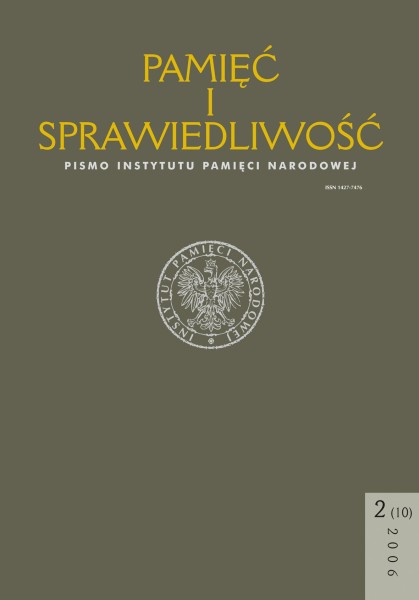Polacy internowani w obozie NKWD nr 270 w Borowiczach w latach 1944–1949
Pamięć i Sprawiedliwość, Tom 10 Nr 2 (2006), strony: 209-230
Data publikacji: 2006-12-30
Abstrakt
In autumn 1944 the activities of the Soviet repressive apparatus against Polish independence underground had been intensifi ed. Organs of NKVD, NKGB and „Smersh” counter-intelligence arrested massively (under the pretext of so called „cleaning the backgrounds of the Red Army”) soldiers of different conspiracy forms. The vast majority of them after a short stay in temporary camps at Polish territory was sent to NKVD USSR camps as the interned.
One of the largest concentration of arrested soldiers of Armia Krajowa (Home Army) was POW camp No 270 in Borovichy in Novgorod district. The total number of Poles and prewar Polish citizens who were taken to Borovichy in 1944 and 1947 equals 5795. They were usually young people, in their twenties or thirties, of different origin and education, engaged into conspiracy activity of the Polish Secret State, both in its civil and military structures.
Lot of Poles kept in the camp in 1944–1946 was the most tragic one because of the high death rate, caused by crippling work in the coal mines, lack of proper food and health care and terrible sanitary conditions. On the other hand, in that period the number of arrests and escapes was relatively small in comparison to the period of 1947–1949. Improvement of living, sanitary and food supply conditions, and above all reorganisation of camp work
system had a big impact on the lowering death rate (from 11,5% in 1945 to 0,2% in 1948) and general improvement of conditions of Polish contingent.
The repatriation process of Polish prisoners of Borovichy (the period of 1946–1949) was made on the basis of appropriate orders of NKVD ZSRR. Repatriations were usually preceded
by quite intensive questioning on the territory of the camp by special operational groups.
 Język Polski
Język Polski
 English
English
 Deutsch
Deutsch
 Français (France)
Français (France)
 Italiano
Italiano
 Русский
Русский


 PDF
PDF
